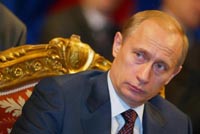Putin, EU leaders to sign visa agreements

Austrian Chancellor Wolfgang Schuessel, whose country currently holds the EU presidency, European Commission President Jose Manuel Barroso and EU foreign policy chief Javier Solana were meeting with Putin at the Russian leader's Black Sea retreat in the resort of Sochi. Putin treated them to an informal seaside dinner late Wednesday before the summit's formal opening Thursday.
But the warm words could not mask the energy disputes that have hung over the relationship since January, when a brief disruption in Russian gas supplies to Western Europe amid a price dispute with Ukraine tarnished Russia's reputation as a reliable supplier and encouraged the EU to intensify a search for alternative supply routes.
Putin said Moscow was looking out for Europe's interests.
Schuessel emphasized that "the energy dialogue is a very important one, and it should be based on transparency, reciprocity, on safe connections and safe deliveries."
Ironically, the New Year's shutdown, which was followed by gas shortages amid a harsh winter, came as Russia declared energy security to be a top priority of its leadership this year of the Group of Eight leading industrialized nations.
European fears of excessive energy reliance on Russia, which supplies a quarter of Europe's gas and is its second-biggest supplier of oil, increased further amid talk that Russia's state-controlled natural gas giant, Gazprom, was considering acquiring Britain's largest gas distributor and negotiating similar deals in other EU nations, the AP reports.
When British officials warned of possible legal changes to block such a deal, Gazprom and even Putin himself angrily warned that the gas monopoly could refocus its future export strategy toward an energy-hungry eastern neighbor - China - if the EU blocked the company's access to the European retail gas markets.
Both sides have toned down their rhetoric since then, as the Europeans realized the measure of their dependence on Gazprom, and the Kremlin became cautious to avoid a public spat with the EU on top of a growing rift with Washington that threatens to mar the G-8 summit in St. Petersburg in July.
EU External Relations Commissioner Benita Ferrero-Waldner said that while Gazprom wanted to expand its presence in Europe, Russia also needed to offer broader possibilities to the European companies "with regard to the gas infrastructure."
Subscribe to Pravda.Ru Telegram channel, Facebook, RSS!




